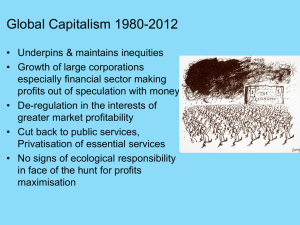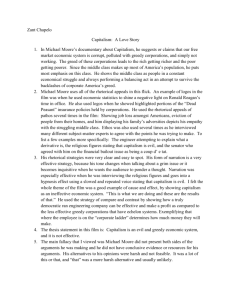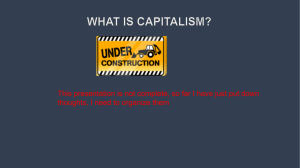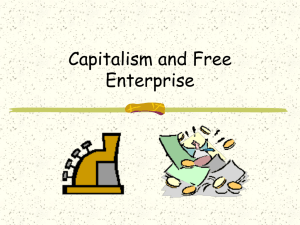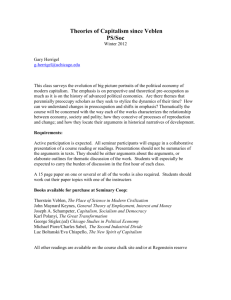Chapter Four What we know as “capitalism” did not fully emerge
advertisement
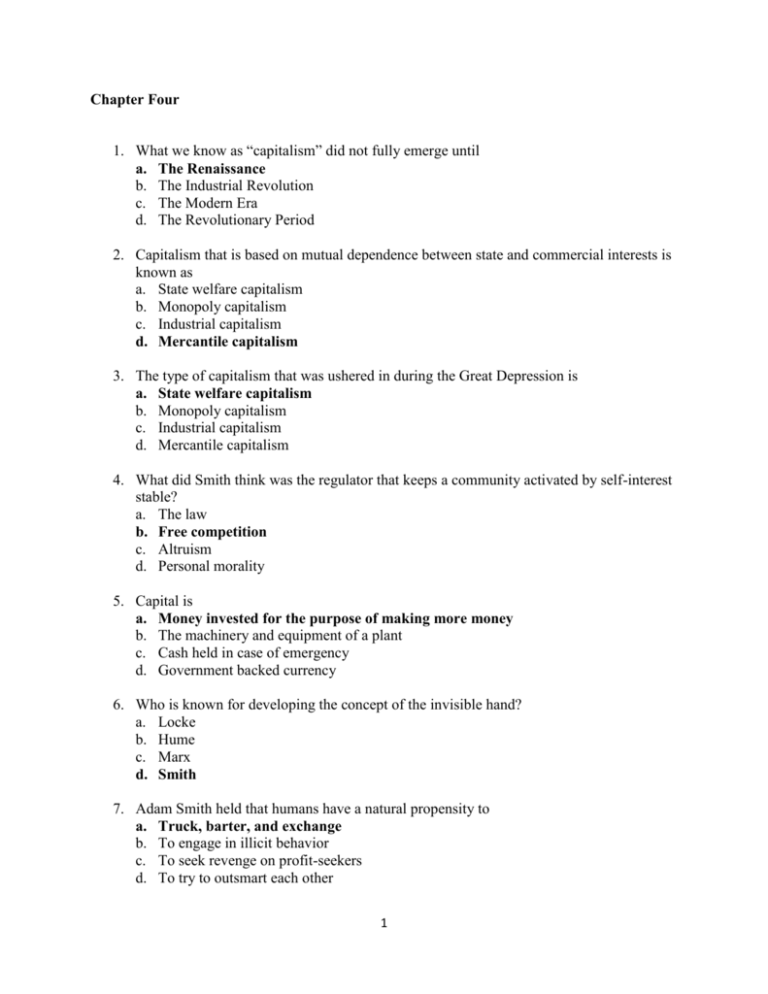
Chapter Four 1. What we know as “capitalism” did not fully emerge until a. The Renaissance b. The Industrial Revolution c. The Modern Era d. The Revolutionary Period 2. Capitalism that is based on mutual dependence between state and commercial interests is known as a. State welfare capitalism b. Monopoly capitalism c. Industrial capitalism d. Mercantile capitalism 3. The type of capitalism that was ushered in during the Great Depression is a. State welfare capitalism b. Monopoly capitalism c. Industrial capitalism d. Mercantile capitalism 4. What did Smith think was the regulator that keeps a community activated by self-interest stable? a. The law b. Free competition c. Altruism d. Personal morality 5. Capital is a. Money invested for the purpose of making more money b. The machinery and equipment of a plant c. Cash held in case of emergency d. Government backed currency 6. Who is known for developing the concept of the invisible hand? a. Locke b. Hume c. Marx d. Smith 7. Adam Smith held that humans have a natural propensity to a. Truck, barter, and exchange b. To engage in illicit behavior c. To seek revenge on profit-seekers d. To try to outsmart each other 1 8. Unlike other species, we have an almost constant need for a. Companionship b. The assistance of others c. Trading d. Luxury goods 9. The two types of criticism that capitalism is subject to are a. Theoretical and moral b. Theoretical and operational c. Operational and practical d. Practical and substantive 10. The theory of capitalism rests on a view of humans as a. Rational economic creatures b. Emotional creatures c. Altruistic creatures d. Irrational economic creatures 11. Karl Marx argued that capitalism leads to a. Wealth b. Opportunity c. Aristocracies d. Oligopolies 12. The biggest five refiners in the United States control a. 35% of the market b. 47% of the market c. 56% of the market d. 68% of the market 13. From 1995 to 2002, U.S. taxpayers spent around a. $86 billion in subsidies to farmers b. $114 billion in subsidies to farmers c. $147 billion in subsidies to farmers d. $198 billion in subsidies to farmers 14. Subsidies for farmers and tariffs on steel, sugar, and ethanol are examples of a. Free market principles b. Patriotic fervor c. Corporate welfare d. The common good 15. The 2008 Troubled Assets Relief Program cost a. $250 billion b. $400 billion 2 c. $600 billion d. $700 billion 16. Karl Marx held that capitalists make profits through a. Free and fair market exchange b. Ingenious marketing c. Exploiting their workers d. Fraudulent wages 17. Karl Marx held that workers inevitably experience a. Alienation b. Poverty c. Fraud d. Violence 18. The hundreds of workers interviewed by Studs Terkel all spoke of a. Injustice b. Rationalization c. Downsizing d. Dehumanization 19. Historically, capitalists have made money by a. Exploiting their workers b. Producing goods c. Providing financial advice d. Defrauding shareholders 20. Companies that now produce only the package and the label of the goods they sell are a. Fraudulent corporations b. Dummy corporations c. Hollow corporations d. Capitalist corporations 21. The United States owes the rest of the world a. $400 billion b. $900 billion c. $2 trillion d. $3 trillion 22. The view that work is valuable for its own sake is the a. American way b. Protestant way c. Work ethic d. Marxist view 23. Paul Kostek is a 3 a. b. c. d. Developmental economist Career development expert Marxist historian Libertarian philosopher 24. Americans work ____ more than they did in 1970. a. 10% b. 16% c. 20% d. 32% F 1. Americans work less than the French. T 2. In 2008 the United States pushed the world into an economic crisis. T 3. In a capitalist system the major proportion of production and distribution is in private hands. T 4. Socialism is a system characterized by public ownership of property and a planned economy. T 5. Yugoslavia once approximated worker control socialism. F 6. An old stage of capitalist development was globalized capitalism. T 7. The phrase “laissez faire” means “to let people do as they choose”. F 8. Capital is unrelated to private property. T 9. John Locke believed that people have a natural right to private property. F 10. Smith gave careful arguments for the view that humans are acquisitive creatures. T 11. Smith believed in the law of supply and demand. F 12. There are no operational objections to capitalism. 1. Do you believe that self-interest can lead to the beneficial results that Smith envisaged? Why, or why not? Support your view with empirical support. 2. What do you think is the most persuasive (a) theoretical objection to capitalism, and (b) operational objection to capitalism, and why? 4 3. If capitalism is more effective that socialism for producing wealth, does that necessarily make it a more moral system? Explain your answer. 4. Do you believe that we should temper laissez-faire capitalism with laws designed to curb its excesses? What might those excesses be? Since the type of laws we would use would be coercive, would we be justified in coercing some persons for the good of others? Why, or why not? 5. Do you believe that “competition isn’t what it’s cracked up to be”? Why, or why not? Why do you think that Adam Smith was so sanguine about the benefits of competition? 6. Do you think that “price gouging” is morally acceptable or not? Explain your answer, drawing on the views of Adam Smith and Karl Marx to do so. Chapter Five 1. The persons who provide the capital to a corporation are its a. Executives b. Beneficiaries c. Stockholders d. Directors 2. Modern corporations are, in principle a. Single-tiered structures b. Two-tiered structures c. Three-tiered structures d. Horizontal organizations 3. _______ ______ is a key feature of the modern corporation. a. Limited liability b. Stakeholder sharing c. Guaranteed profitability d. Government protection 4. The stock of publically held companies is traded a. Privately b. Between directors only c. Among the general public d. Between government departments 5. What did Nicholas Murray Butler hold was the greatest discovery of modern times? a. Penicillin 5 b. Printing c. The limited liability corporation d. Stock options to executives 6. The incorporation of business enterprises began a. During the Elizabethan era b. During the Victorian era c. During the Edwardian era d. During the Industrial Revolution 7. The first instance of the corporate organization of a manufacturing enterprise in the United States occurred in a. 1743 b. 1813 c. 1867 d. 1911 8. The East India Company was formed in a. 1675 b. 1600 c. 1765 d. 1800 9. Corporations are clearly a. Evil b. Legal agents c. Moral agents d. Immoral agents 10. Lord Thurlow said that you could not expect a corporation to have a. A soul b. A conscience c. High profits d. Continuous profitability 11. Thomas Donaldson holds that corporations can be a. A force for good b. Moral agents c. Accountable for their wrong-doing in the past d. Dissolved by government fiat 12. Peter French controversially believes that corporate acts are a. Intentional b. Self-interested c. For the common good d. For the benefits of their executives only 6 13. The narrow view of corporate responsibility is endorsed by a. Milton Friedman b. John Rawls c. Karl Marx d. Michael Walzer 14. The narrow view of corporate responsibility is that corporations should only a. Maximize profits b. Secure the common good c. Benefit their stakeholders d. Manufacture goods 15. Who wrote of “the rules of the game”? a. Karl Marx b. Milton Friedman c. David Freidman d. John Rawls 16. Keith Davis believes that a. Social responsibility arises from social power b. Social responsibility undermines social power c. Fiscal responsibility is the hallmark of success d. Fiscal responsibility leads to social responsibility 17. The stakeholder model is also called the a. Corporate welfare model b. Social welfare model c. Social entity model d. Corporate entity model 18. Who cast the case for a broader view of corporate responsibility is a historical perspective? a. Melvin Anshen b. John Kay c. John Davis d. Michael Walzer 19. The unintended negative or positive effects of business activity are called by economists a. Fall out b. Externalities c. Indemnities d. Secondary effects 20. Who owns a company? a. Executives 7 b. Stakeholders c. Stockholders d. Corporations 21. Adam Smith claims that an invisible hand a. Guides good business managers b. Makes the world safe for God-fearing people c. Promotes the general good d. Takes from the poor and gives to the rich 22. Paul Camenisch holds that business a. Is a great force for good b. Propagates a view of humanity and the good life c. Is seeking to control our minds d. Controls our subconscious desires 23. Christopher Stone argues that there are limits a. To what the law can do b. To what corporations can do to control us c. To the profits a corporation can make d. To the profits a corporation should make 24. One challenger to the assumption that profits come at the expense of ethics is a. Karl Marx b. Kenneth Arrow c. John Davis d. Milton Friedman T 1. Princeton University is a non-profit corporation. T 2. Kenneth E. Goodpaster holds that corporations can show the same respect for persons as individual human beings can. F 3. Manuel Velasquez holds that corporations can be held morally responsible. T 4. The diffusion of responsibility can mean that no person in a corporation can be morally responsible for its actions. F 5. David Friedman wrote Capitalism and Freedom. F 6. Friedman’s bottom line is that the bottom line is not all that counts. T 7. Externalities can be positive. 8 T 8. Boards of directors typically rubber-stamp the decisions of management. F 9. 88% of job seekers prefer to work for a company that supports social causes. F 10. Theodore Levitt holds that corporations should pursue social justice. T 11. Kenneth Arrow holds that any kind of settled economic life requires a degree of ethical behavior. T 12. Milton Snoeyenbos holds that corporations should espouse a corporate moral code. 1. Do you believe that corporations can be considered moral agents? If so, why? If not, why not? 2. Do you endorse the narrow view of corporate responsibility, the broad view, some combination of them, or neither? Argue for your position, engaging with the views of the authors discussed in this chapter as you do so. 3. Many job-seekers would prefer to work for a company that supports social causes, but there is also a concern on the part of many that corporations have an undue influence on society. Are these two views in tension with other, or not? Explain your answer. 4. Do you believe that corporations can be moral agents? If so, why? If not, why not? Does the answer to this question have any practical import, or not? 5. How could we encourage the institutionalization of ethical behavior within corporations? 6. Do you believe that we can expect corporations to act morally, or should we require the government to guide and direct their behavior in this way? Do we have any reason to believe that governments will be better moral guides than corporations? Why, or why not? 9

